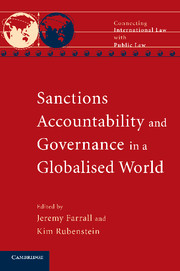Book contents
- Frontmatter
- Contents
- Contributors
- Series editors' preface
- Editors' preface
- Introduction: Filling or falling between the cracks? Law's potential
- PART I Setting down the foundations
- PART II Internationalising public law
- PART III Implementing Security Council sanctions
- PART IV The place of corporations
- PART V The role of lawyers
- PART VI Public law and public policy
- 13 Who's responsible? Justiciability of private and political decisions
- 14 AWB and oil for food: Some issues of accountability
- PART VII Parallel case studies
- Concluding remarks
- Bibliography
- Index
13 - Who's responsible? Justiciability of private and political decisions
Published online by Cambridge University Press: 05 October 2010
- Frontmatter
- Contents
- Contributors
- Series editors' preface
- Editors' preface
- Introduction: Filling or falling between the cracks? Law's potential
- PART I Setting down the foundations
- PART II Internationalising public law
- PART III Implementing Security Council sanctions
- PART IV The place of corporations
- PART V The role of lawyers
- PART VI Public law and public policy
- 13 Who's responsible? Justiciability of private and political decisions
- 14 AWB and oil for food: Some issues of accountability
- PART VII Parallel case studies
- Concluding remarks
- Bibliography
- Index
Summary
Introduction
This chapter considers two themes running through this collection: the public/private divide and the national/international divide in the context of the Cole Inquiry. Both the private nature of Australian Wheat Board Limited (AWB) and the international nature of the UN sanctions regime and the Oil-for-Food Programme could be argued to have reduced the Australian Government's responsibility for the circumstances leading to that inquiry. The Australian Government was able to claim that it was not responsible for ensuring the veracity of the information provided by AWB. The Ministers whose portfolios were directly related claimed that the activities of AWB, as a private company, were outside of their control, that they did not know about the payments before they took action and that other bodies under the UN sanctions regime had the obligation to do more in relation to checking the information provided. The distinctions between public and private, national and international, therefore, were used to deflect responsibility – at least at the political level – away from any deficiencies in the establishment of appropriate governance structures.
Other chapters in this volume examine the legal responsibility that was or perhaps should have been placed on the Australian and other governments in relation to the UN sanctions regime. This chapter seeks to demonstrate the role any characterisation as private or international has within the Australian system of public law.
- Type
- Chapter
- Information
- Sanctions, Accountability and Governance in a Globalised World , pp. 313 - 333Publisher: Cambridge University PressPrint publication year: 2009



